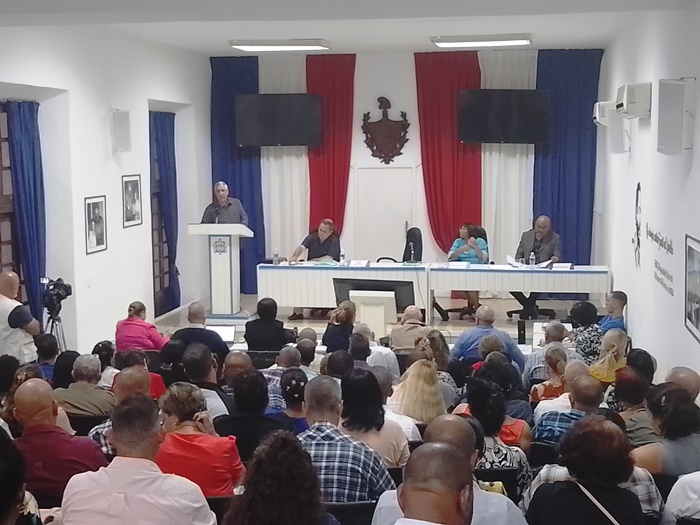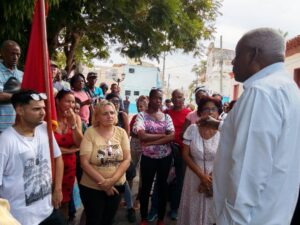Actions to correct distortions and boost the economy are analyzed in the Government Council.

Exif_JPEG_420
As part of the meeting, the governor of Matanzas, Marieta Poey Zamora, gave an account of her administration.

In the presence of the Vice Prime Minister of the Republic of Cuba, Eduardo Martínez Díaz, the Council of the Provincial Government of People’s Power in Matanzas analyzed the results of the 295 actions to correct distortions and boost the economy.
The governor, Marieta Poey Zamora, read the report on the progress of the main economic and social programs. Regarding agriculture, she stated that the production of beans was 94 percent of the planned level, but she pointed out serious failures in the delivery of eggs, 36 percent of the planned level, and the planting of plantain with extradenso technology, 41.1 percent of the planned level.
At the end of October, more than 4,300 tons of wet paddy rice had been collected, although the Governor insisted on the need to achieve greater control of production and called for better use of the areas.
One of the issues that most affects the territory is milk production, which affects approximately 4 million liters and 3,000 children. This is influenced by the non-payment of the Empresa de Productos Lácteos (Dairy Products Company) to farmers and cooperative members. Another item with a notable impact is pork, with the delivery of only 38.2 percent of the food destined for social programs.
In his report, Poey Zamora pondered the planting in the cold season. In making a balance of the main economic indicators, he explained that with 827.8 million pesos more than planned, the territory stands out for meeting total net sales. This means that 141 of the 220 productions or physical items are fulfilled.
However, it noted that the plan for commercial circulation was deficient, at only 25.4 percent, with 823.4 million pesos less than planned. This decrease is due to the non-compliance of twelve Municipal Commerce and Gastronomy Companies.
The province is in surplus by about 390 million pesos, that is, able to capture the money it spends. Poey Zamora insisted on the need to carry out a deeper analysis of the 17 loss-making companies in the province, such as Agroindustrial Victoria de Girón, Avícola, Silos, Pecuaria Genética San Juan, de Acopio y Beneficio de Tabaco and Textilera Eddio Teijeiro.
There is unexecuted money in social impact programs such as attention to neighborhoods, subsidies and social assistance.
«In the social policy, from my actions I must influence in the best use of the budget, benefit more people and get them out of the state of vulnerability, complete the 46 districts without social workers, achieve a more effective operation of the social prevention groups in all the People’s Councils», she said.
The Governor informed that the people’s dissatisfaction with the banking process persists, especially due to the lack of cash. Although she acknowledged the increase in the number of digital operations and delivery of magnetic cards.
As part of the Extraordinary Government Council, the Governor gave an account of her administration. She explained the actions to prioritize the attention to the population’s concerns. Among them, she mentioned: the existence of micro-dumps and instability with garbage collection, the poor state of roads and highways; the need to improve electric lines and change poles; high transportation prices; difficulties with water supply and leaks; delay in the arrival of the basic food basket; and the availability of money in the banks.
«On a fortnightly basis, I analyze the Plan and Budget, I follow the exports, the attention to the neighborhoods, the indicators of the Mother and Child Program, I make visits to the municipalities to control the fulfillment of the projections, I participate in the Municipal Administration Councils and I contribute to promote the revival in the provincial capital», she pointed out.
In addition to the members of the Council, the meeting was attended by the Ministers of Finance and Prices, Vladimir Regueiro Ale; of Labor and Social Security, Marta Elena Feitó Cabrera; of Domestic Trade, Betsy Díaz Velázquez; and the Vice President of the Central Bank of Cuba, Alberto Quiñones Betancourt.
Written by Pedro Rizo.




